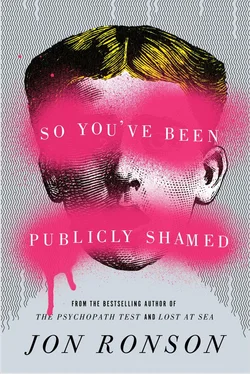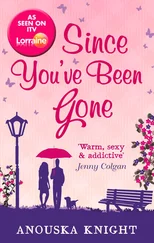At this, Justine started to cry. I sat looking at her for a moment. Then I tried to say something hopeful to improve the mood.
“Sometimes things need to reach a brutal nadir before people see sense,” I said. “So maybe you’re our brutal nadir.”
“Wow,” Justine said. She dried her eyes. “Of all the things I could have been in society’s collective consciousness, it never struck me that I’d end up a brutal nadir.”
A woman approached our table — a friend of Justine’s. She sat down next to her, fixed her with an empathetic look, and said something at such a low volume I couldn’t hear it.
“Oh, you think I’m going to be grateful for this?” Justine replied.
“Yes, you will,” the woman said. “Every step prepares you for the next, especially when you don’t think so. I know you can’t see that right now. That’s okay. I get it. But come on. Did you really have your dream job ?”
Justine looked at her. “I think I did,” she said.
• • •
I got an e-mail from the Gawker journalist Sam Biddle — the man who may have started the onslaught against Justine. One of Justine’s 170 followers had sent him the tweet. He retweeted it to his 15,000 followers. And that’s how it may have begun.
“The fact that she was a PR chief made it delicious,” he e-mailed me. “It’s satisfying to be able to say ‘OK, let’s make a racist tweet by a senior IAC employee count this time.’ And it did. I’d do it again.”
Her destruction was justified, Sam Biddle was saying, because Justine was a racist, and because attacking her was punching up. They were cutting down a member of the media elite, continuing the civil rights tradition that started with Rosa Parks, the hitherto silenced underdogs shaming into submission the powerful racist. But I didn’t think any of those things were true. If punching Justine Sacco was ever punching up — and it didn’t seem so to me given that she was an unknown PR woman with 170 Twitter followers — the punching only intensified as she plummeted to the ground. Punching Jonah Lehrer wasn’t punching up either — not when he was begging for forgiveness in front of that giant-screen Twitter feed.
A life had been ruined. What was it for: just some social media drama? I think our natural disposition as humans is to plod along until we get old and stop. But with social media, we’ve created a stage for constant artificial high drama. Every day a new person emerges as a magnificent hero or a sickening villain. It’s all very sweeping, and not the way we actually are as people. What rush was overpowering us at times like this? What were we getting out of it?
I could tell Sam Biddle was finding it startling too — like when you shoot a gun and the power of it sends you recoiling violently backward. He said he was “surprised” to see how quickly Justine was destroyed: “I never wake up and hope I get to fire someone that day — and certainly never hope to ruin anyone’s life.” Still, his e-mail ended, he had a feeling she’d be “fine eventually, if not already. Everyone’s attention span is so short. They’ll be mad about something new today.”
• • •
When Justine left me that evening to clear out her desk, she got only as far as the lobby of her office building before she collapsed on the floor in tears. Later, we talked again. I told her what Sam Biddle had said — about how she was “probably fine now.” I was sure he wasn’t being deliberately glib. He was just like everyone who participates in mass online destruction. Who would want to know? Whatever that pleasurable rush that overwhelms us is — group madness or something else — nobody wants to ruin it by facing the fact that it comes with a cost.
“Well, I’m not fine,” Justine said. “I’m really suffering. I had a great career and I loved my job and it was taken away from me and there was a lot of glory in that. Everybody else was very happy about that. I cried out my body weight in the first twenty-four hours. It was incredibly traumatic. You don’t sleep. You wake up in the middle of the night forgetting where you are. All of a sudden you don’t know what you’re supposed to do. You’ve got no schedule. You’ve got no”—she paused—“purpose. I’m thirty years old. I had a great career. If I don’t have a plan, if I don’t start making steps to reclaim my identity and remind myself of who I am on a daily basis, then I might lose myself. I’m single. So it’s not like I can date, because we google everyone we might date. So that’s been taken away from me too. How am I going to meet new people? What are they going to think of me?”
She asked me who else was going to be in my book about people who had been publicly shamed.
“Well, Jonah Lehrer so far,” I said.
“How’s he doing?” she asked me.
“Pretty badly, I think,” I said.
“Badly in what way?” She looked concerned — I think more for what this might prophesy about her own future than about Jonah’s.
“I think he’s broken,” I said.
“When you say Jonah seems broken, what do you mean?” Justine said.
“I think he’s broken and that people mistake it for shamelessness,” I said.
People really were very keen to imagine Jonah as shameless, as lacking in that quality, like he was something not quite human that had adopted human form. I suppose it’s no surprise that we feel the need to dehumanize the people we hurt — before, during, or after the hurting occurs. But it always comes as a surprise. In psychology it’s known as cognitive dissonance. It’s the idea that it feels stressful and painful for us to hold two contradictory ideas at the same time (like the idea that we’re kind people and the idea that we’ve just destroyed someone). And so to ease the pain we create illusory ways to justify our contradictory behavior. It’s like when I used to smoke and I’d hope the tobacconist would hand me the pack that read SMOKING CAUSES AGING OF THE SKIN instead of the pack that read SMOKING KILLS — because aging of the skin? I didn’t mind that .
—
Justine and I agreed to meet again, but not for months, she told me. We’d meet again in five months. She was compelled to make sure that this was not her narrative. “I can’t just sit at home and watch movies every day and cry and feel sorry for myself,” she said. I think Justine wasn’t thrilled to be included in the same book as Jonah. She didn’t see herself as being anything like Jonah. Jonah lied repeatedly, again and again. How could Jonah bounce back when he’d sacrificed his character and lied to millions? Justine had to believe that there was a stark difference between that and her making a tasteless joke. She did something stupid, but she didn’t trash her integrity.
She couldn’t bear the thought of being preserved within the pages of my book as a sad case. She needed to avoid falling into depression and self-loathing. She knew that the next five months were going to be crucial for her. She was determined to show the people who had smashed her up that she could rise again.
How could she tell her story, she thought, when it was just beginning?
• • •
The day after my lunch with Justine, I caught the train to Washington, D.C., to meet someone I had prejudged as a frightening man — a fearsome American narcissist — Ted Poe. For the twenty or so years he was a judge in Houston, Poe’s nationally famous trademark was to publicly shame defendants in the showiest ways he could dream up, “using citizens as virtual props in his personal theater of the absurd,” as the legal writer Jonathan Turley once put it.
Given society’s intensifying eagerness to publicly shame people, I wanted to meet someone who had been doing it professionally for decades. What would today’s citizen shamers think of Ted Poe — his personality and his motivations — now that they were basically becoming him? What impact had his shaming frenzy had on the world around him — on the wrongdoers and the bystanders and himself?
Читать дальше












